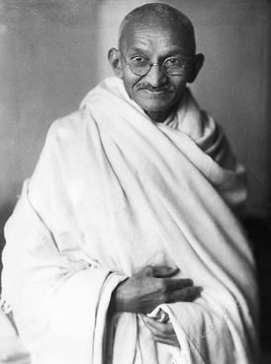Mohandas Karamchand Gandhi
Mohandas Karamchand Gandhi was born on 2 October 1869 in Porbandar in Gujarat. After university, he went to London to train as a barrister. He returned to India in 1891 and in 1893 accepted a job at an Indian law firm in Durban, South Africa. Gandhi was appalled by the treatment of Indian immigrants there, and joined the struggle to obtain basic rights for them. During his 20 years in South Africa he was sent to prison many times. Influenced primarily by Hinduism, but also by elements of Jainism and Christianity as well as writers including Tolstoy and Thoreau, Gandhi developed the satyagraha ('devotion to truth'), a new non-violent way to redress wrongs. In 1914, the South African government conceded to many of Gandhi's demands.
Gandhi returned to India shortly afterwards. In 1919, British plans to intern people suspected of sedition - the Rowlatt Acts - prompted Gandhi to announce a new satyagraha which attracted millions of followers. A demonstration against the acts resulted in the Amritsar Massacre by British troops. By 1920, Gandhi was a dominant figure in Indian politics. He transformed the Indian National Congress, and his programme of peaceful non-cooperation with the British included boycotts of British goods and institutions, leading to arrests of thousands.
In 1922, Gandhi himself was sentenced to six years' imprisonment. He was released after two years and withdrew from politics, devoting himself to trying to improve Hindu-Muslim relations, which had worsened. In 1930, Gandhi proclaimed a new campaign of civil disobedience in protest at a tax on salt, leading thousands on a 'March to the Sea' to symbolically make their own salt from seawater.
In 1931, Gandhi attended the Round Table Conference in London, as the sole representative of the Indian National Congress, but resigned from the party in 1934 in protest at its use of non-violence as a political expedient. He was replaced as leader by Jawaharlal Nehru.
In 1945, the British government began negotiations which culminated in the Mountbatten Plan of June 1947, and the formation of the two new independent states of India and Pakistan, divided along religious lines. Massive inter-communal violence marred the months before and after independence. Gandhi was opposed to partition, and now fasted in an attempt to bring calm in Calcutta and Delhi. On 30 January 1948, he was assassinated in Delhi by a Hindu fanatic.
Gandhi and Sikhs
Gandhi has been reported to have called Guru Gobind Singh, the tenth Guru of the Sikhs, a 'misguided patriot,' because he said he had used violence. Gandhi has not had a good relation with many Sikhs, because of his relation to freedom-fighters like Shaheed Udham Singh, and Kartar Singh Sarabha. Sikhs have always been taught to use a sword only as a last resort, and Gandhi was unable to understand that.
Gandhi and the credit he is given
The nation of India was created in 1947, with World War II, and the many things that were taking place. Many freedom-fighters took part in the movement to get independence. As a high-caste Hindu brahmin, Gandhi was given credit as the 'father of the nation' when many people took part. This has created many criticisms of M.K Gandhi, and has given us a lot to learn about.

